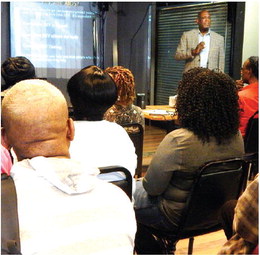Local National Black HIV/AIDS event raises awareness

Local National Black HIV/AIDS event raises awareness
Outreach programs, free testing highlight gathering
news@theeveningtimes.com
Free testing, and information drew a full house to C.J.’s Entertainment in West Memphis for National Black HIV/AIDS Awareness Day event. Guest speakers presented HIV 101, and touted abstinence, read poetry and lead songs. The audience watched a movie called The Monster addressing HIV and discrimination. A new type of HIV rapid testing was offered. The day culminated with a luncheon.
A new rapid results mouth swab test was available on site. The test checks for antibodies with the outcome known in just 20 minutes.
“If antibodies are detected in the saliva, then a followup confirmation test is scheduled,” said Cornelius Mabin, Community Connector in Central Arkansas. The AR Care State Outreach Prevention Coordinator Danny Harris conducted the tests. Participants received a gift card as an incentive to screen.
“I do these all for organizations all over the State,” said Danny Harris. “It’s important to test because we know how to treat it now.
So if there are some that didn’t know they have HIV I can help them get on medication and into treatment. When they take the medicine and they reach an undetectable level they don’t transmit the virus and lead a normal natural life.”
Early detection is essential. Medication is a one a day tablet. Long term impact on overall health is a consequence of delayed detection.
“The medication works either way but there is more damage done to the immune system the longer it goes unchecked,” said Danny Harris.
Cornelius Mabin Health Department Community Connector for Central Arkansas presented HIV 101. He said when people receive treatment it represents the spread of HIV awareness. And the use of preventative measures reduces those that need treatment.
“Get the facts, forget the foolishness,” said Mabin.
“Don’t rely on foolishness.
There is a lot of foolishness out there. If you base your knowledge on foolishness you’re probably going to do some foolish things.”
Mabin said one person in every 159 in Arkansas will be diagnosed with HIV in their lifetime. And the statistics stack up higher among those engaged in high risk behavior.
“Among young gay Black men we continue to see new infections in the age window of 18-34,” said Mabin. “They are the priority population right now as far as new infections in the state.”
New developments in the field will focus on repealing certain law and shifting the vocabulary around HIV/AIDS. A felony offense stands on the books now for those spreading the disease.
“We’ll be addressing that because the science that we have now does not reflect the fear when that particular law was put in place,” said Mabin. “We don’t need to criminalize something that we now know better about.”
Mabin called not only for a change in law but also a a change in language. He suggested a new descriptors concerning HIV/AIDS.
“Our ultimate goal is for it to be called viral suppression because that is what we actually do. We link the virally suppressed to care to get their viral suppression down,” said Mabin.
West Memphis Councilwoman and evangelist at Temple of Deliverance Helen Harris took the stage and pointed to abstinence.
“The best sex is no sex,” said Helen Harris. “We need to bring this education into our schools and into our churches. The best way is to abstain until you have committed relationship. We all know it and that’s what we need to teach children.”
Retired educator Rubye Johnson said its not enough to be aware of HIV/AIDS if acting responsibly is not ultimately part of personal behavior.
“We need to be educated and responsible,” said Johnson. “Being educated and aware should serve as a warning to be responsible.
We can’t leave out that part about personal responsibility.”
By John Rech


Share